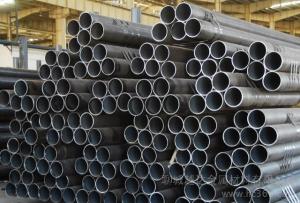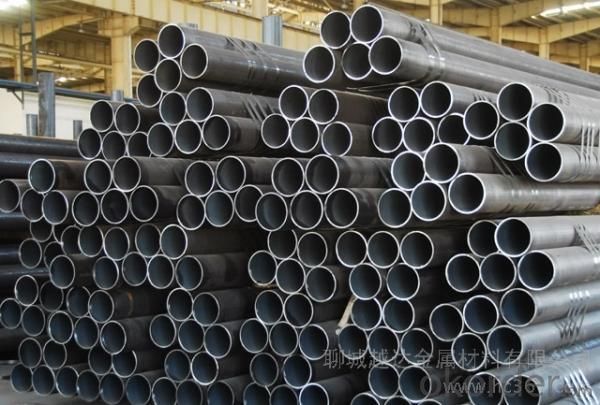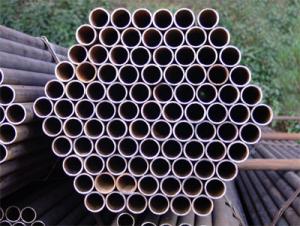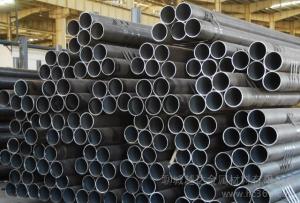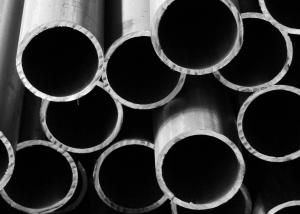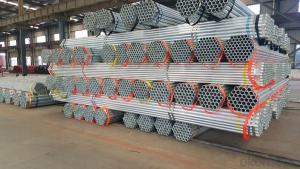Seamless Steel pipes for Gas Cylinder
- Loading Port:
- China Main Port
- Payment Terms:
- TT or LC
- Min Order Qty:
- 5mt m.t.
- Supply Capability:
- 5000 Tons Per Month m.t./month
OKorder Service Pledge
OKorder Financial Service
You Might Also Like
Seamless Steel pipes
Application of Seamless Steel Pipe for Gas Cylinder
The company products including seamless steel gas cylinder
for industry and medical gas use. We can make cylinder
Standard of Seamless Steel Pipe for Gas Cylinder
apply to standard of DOT3AA, JIS8241, EN1964,ISO9809,GB5099, KSB6210.
Certificate of Seamless Steel Pipe for Gas Cylinder
CCS,BV, LLODY'S, ABS.
Description of Seamless Steel Pipe for Gas Cylinder
Standard | GB5099 |
Material | 34Mn2V/37Mn/30CrMo |
Nominal Diameter | 219/232/267/279/325(mm) |
Water Capacity | 20-80(L) |
Nominal Height | 815-1780(mm) |
Nominal Weight | 30.5-103(kg) |
Service Pressure | 15/20(MP) |
Wall Thickness | 4.7-7.0(mm) |
Packing of Seamless Steel Pipe for Gas Cylinder
Black paint or varnish ,plastic caps with the both ends
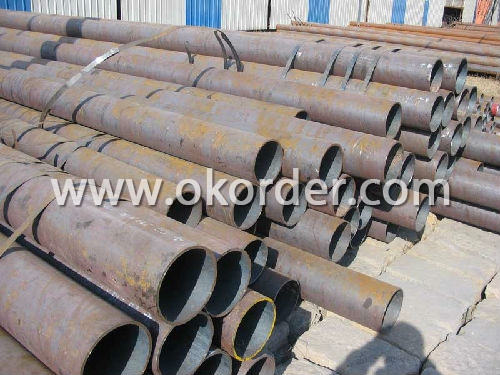
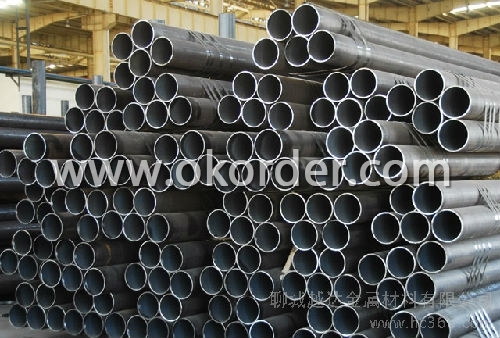
- Q: How are steel pipes threaded for easy installation?
- Steel pipes are threaded for easy installation by using a specialized machine called a pipe threading machine. This machine cuts precise threads onto the ends of the steel pipes, allowing them to be easily connected and tightened together using threaded fittings or couplings. This threading process ensures a secure and leak-proof connection, making installation quick and efficient.
- Q: What is the role of steel pipes in the telecommunications industry?
- Steel pipes play a crucial role in the telecommunications industry as they are used for the installation of underground and overhead telecommunication cables. These pipes provide protection and support to the cables, ensuring their safety and longevity. Additionally, steel pipes are also used in the construction of communication towers and infrastructure, making them an essential component in establishing and maintaining reliable telecommunications networks.
- Q: What does GALV mean in a steel tube?
- Steel pipe is not only used to transport fluid and powder solid, exchange heat energy, and manufacture mechanical parts and containers, but also is an economic steel. It can reduce weight and save 20 to 40% of metal by using steel pipe to make building structure, network frame, prop and mechanical support. Moreover, it can realize factory mechanization construction. Using steel pipe to manufacture road bridge can not only save steel, simplify construction, but also greatly reduce the area of coating protective layer, save investment and maintenance cost.
- Q: Can steel pipes be used for gas distribution?
- Yes, steel pipes can be used for gas distribution. Steel pipes are commonly used for transporting natural gas and other gases due to their high strength, durability, and resistance to corrosion. They can withstand high pressure and are suitable for long-distance gas distribution networks. However, it is important to ensure proper materials and installation techniques are used to prevent any potential safety hazards.
- Q: How are steel pipes used in the manufacturing of scaffolding?
- Steel pipes are commonly used in the manufacturing of scaffolding as they provide structural support and stability. These pipes are used to create the framework of the scaffolding structure, allowing workers to safely access and work at heights. The steel pipes are connected and secured together using couplers, providing a strong and reliable base for the scaffolding system.
- Q: What are the different sizes of threads available for steel pipes?
- The different sizes of threads available for steel pipes vary depending on the specific requirements and standards. Common thread sizes for steel pipes include 1/8", 1/4", 3/8", 1/2", 3/4", 1", 1-1/4", 1-1/2", 2", 2-1/2", 3", 3-1/2", 4", 5", 6", 8", 10", and 12". However, these sizes may vary based on the specific industry, country, and application.
- Q: Can steel pipes be used for scaffolding?
- Yes, steel pipes can be used for scaffolding. Steel pipes are commonly used in scaffolding due to their strength, durability, and ability to support heavy loads. They provide a stable and secure structure for workers to access elevated areas during construction or maintenance projects.
- Q: Are there specifications for scaffold steel pipe with 48mm * 3.2mm?
- However, there are a variety of non GB steel tubes on the market, mainly in the wall thickness, and are thinner than the national standard requirements, you said that thickness may have, but the thinnest only about 2.6mm-2.7mm.
- Q: How are steel pipes protected against microbial corrosion?
- Various methods are employed to safeguard steel pipes against microbial corrosion. One widely used technique entails applying coatings onto the surface of the pipes. These coatings act as a shield, effectively blocking the entry of microbes and their corrosive byproducts into the steel, thereby safeguarding it from degradation. Coatings like epoxy, polyethylene, and fusion bonded epoxy are frequently utilized to bestow this protection. Another method involves the use of corrosion inhibitors. These inhibitors are added to the fluid that flows through the pipes in order to impede microbial growth and prevent corrosion. They can be either organic or inorganic compounds that function by either eradicating the microbes or inhibiting their metabolic activity. Furthermore, ensuring proper maintenance and cleaning of the pipes is vital in preventing microbial corrosion. Regular inspections and cleaning routines aid in the elimination of any biofilms or microbial deposits that may have formed on the pipe's surface. This significantly reduces the likelihood of microbial corrosion and prolongs the lifespan of the pipes. In certain cases, cathodic protection may also be employed. This method entails utilizing sacrificial anodes or impressed current systems to supply a protective electrical current to the pipe. This current helps prevent the formation of corrosive microorganisms and shields the steel from corrosion. In summary, a combination of coatings, corrosion inhibitors, regular maintenance, and cathodic protection techniques are employed to protect steel pipes from microbial corrosion. By utilizing these strategies, the longevity and integrity of the pipes are ensured, benefiting various industries such as oil and gas, water supply, and sewage systems.
- Q: How are steel pipes used in the construction of airports?
- Steel pipes are commonly used in the construction of airports for various purposes such as drainage systems, water supply lines, fuel pipelines, and structural supports. They provide durability, strength, and corrosion resistance, ensuring the efficient operation and safety of airport infrastructure.
1. Manufacturer Overview
| Location | Zhejiang, China |
| Year Established | 2007 |
| Annual Output Value | Below US$1 Million |
| Main Markets | |
| Company Certifications | API;ISO9001 |
2. Manufacturer Certificates
| a) Certification Name | |
| Range | |
| Reference | |
| Validity Period |
3. Manufacturer Capability
| a) Trade Capacity | |
| Nearest Port | Shanghai |
| Export Percentage | 41% - 50% |
| No.of Employees in Trade Department | 300-500 People |
| Language Spoken: | English; Chinese |
| b) Factory Information | |
| Factory Size: | 360,000 Squre meters |
| No. of Production Lines | Above 10 |
| Contract Manufacturing | OEM Service Offered;Design Service Offered |
| Product Price Range | High Average |
Send your message to us
Seamless Steel pipes for Gas Cylinder
- Loading Port:
- China Main Port
- Payment Terms:
- TT or LC
- Min Order Qty:
- 5mt m.t.
- Supply Capability:
- 5000 Tons Per Month m.t./month
OKorder Service Pledge
OKorder Financial Service
Similar products
Hot products
Hot Searches
Related keywords
